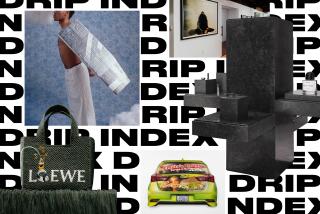‘Underground Orchestra’ in Paris
- Share via
Heddy Honigmann’s “The Underground Orchestra,” which opens a one-week run Friday at the Grande 4-Plex as part of the “Documentary Days” series, is a splendid example of how illuminating and entertaining a documentary can be.
The Lima, Peru-born, Netherlands-based Honigmann filmed musicians performing on the streets and subway stations of Paris, then got them to talk on camera--which required following many of them into their tiny apartments. The result is a portrait of political exiles--from Algeria, Zaire, Vietnam, Romania and the former Yugoslavia--whose musical talents enable them to survive in the far-from-welcoming City of Light. These people are as brave as they are talented, and their music becomes an expression of their indomitable spirits. This tremendously affecting film would have been even more so had Honigmann identified her subjects in the film instead of relegating their names to a list on the end crawl, an all-too-common practice nowadays. (213) 617-0268.
*
The Los Angeles County Museum of Art’s centennial tribute “Mad About the Boy: Noel Coward on Film,” starts Friday with “Private Lives” (1931), starring Norma Shearer, Robert Montgomery and Reginald Denny, and “Cavalcade” (1933), winner of a best picture Oscar.
While “Private Lives” is based on one of Coward’s most frequently revived works, “Cavalcade” is decidedly less familiar, despite its Oscar. It is a pageant of British history from New Year’s Eve 1899, through New Year’s Eve 1933, as experienced by an aristocratic London couple, Sir Robert Marryot (Clive Brook) and his elegant wife, Jane (Diana Wynyard). Reginald Berkeley gracefully adapted Coward’s play, and the script is directed painstakingly by Frank Lloyd.
The film still stirs but seems melancholy as our own millennium approaches. Married a decade when their story starts, the Marryots’ perfect marriage is shadowed by the Boer War and World War I, not to mention the Titanic--an episode that seems to pile it on a bit much. Wynyard’s Jane is the film’s central figure, and she seems more contemporary than ever with her strong antiwar sentiments, which are very much at odds with everyone else in her world. That “Cavalcade” builds to a final note of tranquillity seems cruelly ironic, for 1933 would mark the depth of the Great Depression and Hitler’s rise to power, making World War II an inevitability six years later.
Still, the strength of British character that gets Jane and Robert through the first one-third of the 20th century is exactly what it took for Britain to stand fast in what Winston Churchill would call its “finest hour.” Some moments may seem a bit dated, but the use of popular music, especially during a stunning montage that encapsulates the Great War and its dire toll, remain striking and deeply moving.
The series “Mad About the Boy” continues at LACMA Fridays and Saturdays at 7:30 p.m. through Oct. 2. (323) 857-6010.
*
It’s not easy being the women’s junior-welterweight champion of the world. Blond and blue-eyed, Gina (Boom Boom) Guidi, exudes an appealing mix of tenderness and toughness as she recounts how boxing became a salvation in Laura Plotkin’s 56-minute documentary, “Red Rain.”
Guidi, 35, a San Leandro resident, is a recovering alcoholic and lesbian working on her self-acceptance. Raised by a single mother, Guidi and her three brothers admit to growing up headstrong and wild, but her success as an athlete has clearly had a salutary, stabilizing effect on her entire family.
“Red Rain,” as sensitive as it is succinct, takes us into a boxing world where both men and women train hard but earn only about $100 a round. In the years Guidi has been boxing, women fighters have become less a rarity, yet as self-assured as she is, she was reluctant to discuss her sexual orientation on camera. It took Plotkin two years to persuade her to do so. Guidi wants to be perceived foremost as an athlete, and hopes people won’t conclude her homosexuality somehow led her to boxing.
She has inevitably encountered homophobia. “Red Rain’s” most jolting moment occurs not in the ring but just after winning her championship. In tears, she relates a message on her answering machine in which the caller declared that the publication Lady Boxer was “going to expose you for the dyke you are.” On a far happier note, the mayor of San Leandro announces a “Gina Guidi Day” and proclaims Guidi a role model for women athletes.
“Red Rain” shows Saturday at 9:30 p.m. at Bergamot Station, 2525 Michigan Ave., Santa Monica, as part of the Santa Monica Film Festival. (310) 289-7144.
*
Warming up for Catherine Breillat’s “Romance,” opening Oct. 1, the Nuart is screening four of her earlier pictures over the next two weekends at noon. The ironically titled “Perfect Love!” (screening Saturday) is a corrosive 1996 venture into amour fou starring Isabelle Renauld as a 37-year-old single mother who gets caught up in an affair with a moody younger man (Francois Renaud). Gradually but remorselessly, the relationship deteriorates into an increasingly volatile and lethal situation. More complex and commanding, 1991’s “Dirty Like an Angel” (showing Sunday) starts out as a terse policier but catches us by surprise when officer Claude Brassuer seduces his younger partner’s beautiful, deceptively sedate-looking bride (Lio). It all takes place in one lengthy, intense scene while the partner (Nils Tavernier) is on a surveillance assignment. The ultimate payoff offers yet another twist. Both films reflect a fascination with all-consuming passion. (310) 478-6379.
Kevin Rafferty and Frank Kerauden’s “The Last Cigarette” (at the Nuart Monday through Sept. 23) intercuts the 1994 congressional hearings, in which Rep. Henry Waxman (D-Los Angeles) and his committee made tobacco-industry leaders squirm, with a cornucopia of archival footage, including clips from movies and TV commercials. This deluge of vintage material has the effect of a one-two punch: The commercials insist that smoking is safe and relaxing and the movies show it as glamorous and sophisticated. (Smoking became shorthand for sex in the days of the Hayes Code to a great extent.) Although the filmmakers allow smokers’ rights advocates to have their say, the picture reinforces what most people now are willing to admit: Smoking is bad for you. Unfortunately, “The Last Cigarette” is as facetious in tone as Rafferty’s “Atomic Cafe.” (310) 478-6379.
*
The series “Goethe on Films and Films on Goethe” continues next week with “Clavigo,” Marcel Ophuls’ elegant 1970 film of Fritz Kortner’s staging of the 1774 Goethe play. (Kortner is best remembered as the powerful Berlin publisher vamped by Louise Brooks in G.W. Pabst’s “Pandora’s Box.”) Goethe transformed an actual incident into a revenge tragedy triggered by a poor but ambitious intellectual placing his career before love. Born in the Canary Islands, Clavigo (Thomas Holtzmann) emigrates to France, where the noble Beaumarchais family so advances his prospects he is able to become Spain’s leading man of letters, appointed keeper of the royal archives, no less. Once in Spain, however, Clavigo is encouraged by a close advisor to break off his engagement with a Beaumarchais daughter (Krista Keller) to make a more socially advantageous match. With wry subtlety, Ophuls--who went on to become renowned as a documentarian--underlines the dark humor in Clavigo’s hypocrisy. “Clavigo” screens Tuesday at 7 p.m. at the Goethe Institute, 5759 Wilshire Blvd., Suite 100. (323) 525-3388.
*
Short Takes: The American Cinematheque’s “The Sex-Crazed Cinema of Russ Meyer” commences a nine-day run tonight at 8 at the Egyptian with “Faster, Pussycat! Kill! Kill!” (1966), a thrillingly--and amusingly--lurid action flick in which three ferocious female bikers, led by the fearsome Tura Satana, terrorize--and also seduce--a tiny desert community. Meyer, the King of Nudies, will be present along with Satana and one of the trio’s victims, Susan Bernard. (323) 466-FILM. . . . Part I of “The Deluge,” Jerzy Hoffman’s Oscar-nominated 1974 epic from the Henryk Sienkiewicz historical novel, screens Saturday at 10 a.m. at the Monica 4-Plex, (310) 394-9741 . . .
Anniversaries galore: The Academy of Motion Picture Arts & Sciences, 8949 Wilshire Blvd., Beverly Hills, screens Friday at 8 p.m. a newly restored print of “Easy Rider” to celebrate the 25th anniversary of its release. Dennis Hopper, the film’s director, co-writer and co-star, will be among the event’s special guests. (310) 247-3600. . . . The Nuart will mark the 25th anniversary of the release of “Chinatown” by screening a new 35mm print Friday through Sunday. (310) 478-6379 . . . “Stop Making Sense,” Jonathan Demme’s venturesome Talking Heads concert film, will open a 15th-anniversary re-release run at selected theaters Friday. . . . Strand Releasing’s 10th-anniversary retrospective continues at the Sunset 5 with 11 a.m. weekend screenings of one of Gregg Araki’s best, “The Living End,” about a pair of HIV-infected lovers on the run. (323) 848-3500. . . . The pioneering video showcase EZTV, 6522 Hollywood Blvd., will mark its 20th anniversary with free screenings and a panel discussion on Saturday, 11 a.m.-9 p.m. (323) 462-3678.
More to Read
The biggest entertainment stories
Get our big stories about Hollywood, film, television, music, arts, culture and more right in your inbox as soon as they publish.
You may occasionally receive promotional content from the Los Angeles Times.










